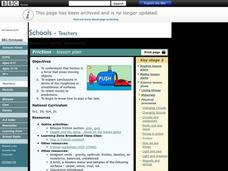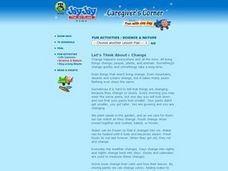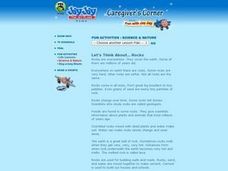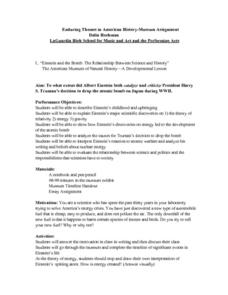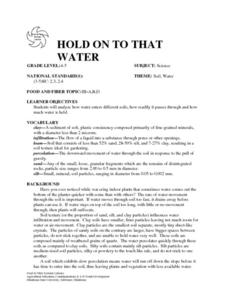Curated OER
Does Shape Affect Drag?
Students study drag and how it affects a parachute in the sky. In this parachutes lesson students build models and compare their drag.
Curated OER
Friction
Students review what force. In this science lesson, students determine which surfaces are rough and which are smooth by observing how an object moves on each surface.
Curated OER
Water Quality Monitoring
Students comprehend the four parameters of water quality. They perform tests for salinity, dissolved oxygen, pH and clarity or turbidity. Students comprehend why scientists and environmental managers monitor water uality and aquatic...
Curated OER
WHY DO SOME THINGS FLOAT WHILE OTHERS SINK
Students explore how density can cause things to sink or float by experimenting with a jar, oil and corn syrup.
Curated OER
Falling
Students should describe the path that the motion would take as well as what might begin or stop the motion. The common characteristic of all the motions that students have experienced directly is that one or more forces are acting on...
Curated OER
Physics Post-Lab
Learners explore physics. In this science lesson, students discuss physics in their everyday lives. Learners complete a physics worksheet.
Curated OER
Lets Think About...Plants
Students bring in various vegetables and make friendship soup. They plant seeds and discuss the things plants need to grow and thrive.
Curated OER
Look Mom, No Wings!
Students explain how drag, weight, lift and thrust work together to make something fly. For this physics lesson, students measure their jump height and record data on the table. They reason out why they can't remain airborne for long.
Curated OER
Let's Think About Water
Pupils explore the different forms that water can take and conduct simple experiments to demonstrate some of its properties in each state. They watch a short video that illustrates some of these concepts.
Curated OER
Reading Comprehension: Oceans
In this ocean comprehension activity, learners read a short passage, then complete 4 short answer questions about oceans. Worksheet contains a link to additional activities.
Curated OER
Let's Think About... Change
Students observe various examples of "change." They mix paint to cereate new colors, eat bread and then toasted bread, and match baby pictures with pictures of how the same people look in the present. Finally, they watch a bouquet of...
Curated OER
Math: Counting on Others
Learners use counting skills to decide who wins the Classroom Winter Games. They use numeral writing and tally marks to keep score. Students have an opportunity to pretend they are competing for medals in the Winter Games while using...
Curated OER
Enduring Themes in American History-Museum Assignment
Young scholars study and research the life of Albert Einstein. They focus on the extent Albert Einstein catalyzed and criticized President Harry S. Truman's decision to drop the atomic bomb on Japan during WWII. Students answer a...
Curated OER
Coal and the Environment
Students read about how burning coal affects the environment. After students finish reading about how burning coal affects the environment they have a group discussion to discuss what they thought about the information.
Curated OER
HOLD ON TO THAT
Students will analyze how water enters different soils, how readily it passes through and how much water is held.1. Materials needed for the activity are; pint of clay, pint of sand, pint of loam, newspaper,
three frozen fruit juice...
Curated OER
Types of Forces
Students study scientific names and descriptions of forces. In this motion lesson students organize information into a graphic organizer then teach it to other students.



